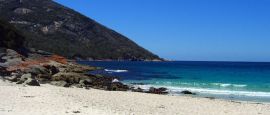Watch water cascade down the 45m (148ft) high Russell Falls, a pretty display of nature in the Mount Field National Park, and contender for most-photographed waterfall in Australia.
Tasmania things to see and do
Tourist offices
Address: 12 Montpelier Place, London, United Kingdom
Tel: (020) 7584 6553.
www.discovertasmania.co.uk
Mt Wellington, Hobart’s iconic backdrop, looms 1,271m (4,170ft) above the city and its snow-capped peaks glisten white for much of the year. The flanks of the mountain are heavily forested and at the summit there is a lookout point, which has beautiful views across the city, all the way through to Bruny Island and Storm Bay, where the Derwent Estuary opens onto the Tasman.
Step into Freycinet National Park on Tasmania's east coast and gambol amongst glorious heaths, wildflowers and the white sands of Wineglass Bay, where the azure waters of the Tasman Sea lap gently on the shore. Absolutely stunning.
Cataract Gorge is a slice of Tasmanian wilderness famous for its basalt cliffs and dramatic scenery. Located just 15 minutes by foot from Launceston, the gorge has various hiking trails, as well as a restaurant, swimming pool and chairlift. Resident peacocks roam the gardens of the nearby visitor centre, which is also home to a café.
Tasmania lays claim to a handful of ski resorts, but the biggest is Ben Lomond, which is home to the Summit Run. If you are planning of skiing there base yourself at the Creek Inn, which has the bragging rights to being Tasmania’s highest pub. Even in the winter Ben Lomond is still worthy of a visit; Alpine wildflowers run rampant in spring and summer when bushwalking becomes the main activity. www.skibenlomond.com.au
Described as a ‘subversive adult Disneyland,’ the controversial Museum of Old and New Art (MONA) has put Tasmania firmly on the cultural map. Its riverside collection boasts 400 works include an Egyptian sarcophagus and a machine that produces, ahem, poo. Located on the Moorilla vineyard, the museum is within staggering distance of a wine bar, microbrewery, restaurant, cinema and fancy guest accommodation, The Pavilions. www.mona.net.au
Located in the beautiful Cradle Mountain National Park, Devils @ Cradle offers visitors the chance to meet some of Tasmania’s most iconic species including the spotted-tail quoll, the eastern quoll and, of course, the iconic Tasmanian devil. The sanctuary was set up to help conserve these endangered species, which are unique to Tasmania. www.devilsatcradle.com
Sail into Tasmanian bliss on a boat or sailing cruise. It's a popular way to explore the port cities of Launceston and Hobart, and outlying islands. You can explore the southwest coast from Strahan on the west coast.
Study Tasmanian colonial era art and Aboriginal art at the Queen Victoria Museum and Art Gallery (www.qvmag.tas.gov.au) at its two locations: the Art Gallery at Royal Park in Launceston, and the Museum in Inveresk. The Gallery exhibits include a Chinese temple and joss house.
Observe the Blowhole, Devil’s Kitchen, Tasman Arch, Tessellated Pavement and other coastal splendours on a scenic drive down the Tasman Peninsula. There are terrific views from Eaglehawk Neck over Pirates Bay and beyond.
Gasp at Tasmania's dramatic mountain peaks, situated in the World Heritage Wilderness Area of Cradle Mountain/Lake St Clair National Park. Famous for the 65km (40 mile) Overland Track bushwalk, the mountain bursts with natural wonders including rainforest, alpine heath, glacial lakes and ancient pines.
Located on a headland facing the river, a 15-minute stroll from the city, the old worldly gardens are an outdoor lover’s joy brimming with century old trees. There’s also a Subantarctic Plant House, heritage buildings and a visitor’s centre embracing souvenir shop, restaurant and art gallery.
A former British penal colony, Port Arthur was described by inmates as ‘hell on Earth.’ Today its crumbling ramparts are a UNESCO World Heritage Site and the most popular tourist attraction in Tasmania. Between 1833 and 1853 it received the most notorious British criminals, who were the subject of physical and psychological punishment.
Suspended above a spectacular forest canopy, some 37m (121ft) above the ground, the Tahune AirWalk certainly requires a head for heights. The lofty causeway forms part of the Huon Trail, which includes detours to the Hastings thermal pool, caves and the sheltered bays of the D'Entrecasteaux Channel. Alternatively, the Hollybank Treetops Adventure involves cable 'flights' above Hollybank Forest Reserve. www.adventureforests.com.au
Located in the Tasmanian Central Highlands, the Walls of Jerusalem National Park offer epic landscapes that belie Tasmania’s diminutive size. Perfect for hiking, the park’s cliffs are thought to resemble the city walls of Jerusalem – hence the name.
Take a walk through Hobart’s historic old town, wandering around Sullivans Cove, through the old warehouses of Salamanca Place and past the Georgian buildings of Battery Point. En route, learn more about the island's history at the Maritime Museum of Tasmania (www.maritimetas.org) and the Tasmanian Museum and Art Gallery (www.tmag.tas.gov.au).
Tasmania's national parks are home to a rich variety of animals, many of them unique to the island. They include wombats, duck-billed platypus, wallabies, fairy penguins and the iconic Tasmanian devil, a small, black, dog-like marsupial. www.parks.tas.gov.au
Do you have any Feedback about this page?
© 2026 Columbus Travel Media Ltd. All rights reserved. No part of this site may be reproduced without our written permission, click here for information on Columbus Content Solutions.








 You know where
You know where